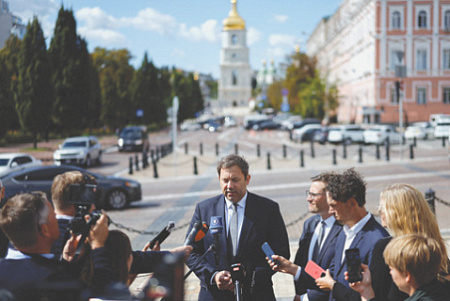
German Vice-Chancellor and Finance Minister Lars Klingbeil made an unannounced visit to Kyiv on Monday, August 25, to reaffirm Germany’s commitment to Ukraine. The trip, reportedly coordinated with Chancellor Friedrich Merz, was aimed at discussing security guarantees and financial aid with Ukrainian government officials, members of parliament, and civil society leaders. Klingbeil emphasized the need to understand Ukraine’s specific requirements to ensure Germany’s support is as effective as possible, particularly in the context of a potential peace process, while reiterating that any negotiations must include Kyiv.
The visit highlights the growing prominence of security guarantees in German foreign policy, a topic that gained momentum after a recent summit in Washington attended by European and Ukrainian leaders. Chancellor Merz has previously raised the possibility of deploying the German military, the Bundeswehr, to help enforce such guarantees directly on Ukrainian territory. This proposal, however, faces staunch opposition from the German public and has proven to be politically divisive.
Public sentiment, particularly in the country’s eastern states, is largely against any Bundeswehr mission in Ukraine. This division is mirrored in the political sphere, where the conservative CDU/CSU bloc stands nearly alone in its support for the Chancellor’s idea. The Alternative for Germany and the Left Party are strongly opposed, while the Greens and Klingbeil’s own Social Democratic Party (SPD) are internally split. Acknowledging this lack of consensus, Klingbeil steered clear of offering a direct military option during his discussions in Kyiv.
Instead, Klingbeil focused on promoting a ceasefire on the front line—another initiative championed by Chancellor Merz—and underscored Germany’s substantial financial contributions. He noted that over the three and a half years of conflict, Berlin’s bilateral aid has surpassed €50 billion. This sum includes approximately €25 billion for supporting Ukrainian refugees in Germany, €17 billion in military supplies, and over €8 billion in direct financial and civilian project support. Looking ahead, Germany has pledged to provide at least €8 billion annually to Kyiv until 2027.
This significant financial commitment to Ukraine comes as the German government faces its own budgetary pressures. Germany is still operating without an approved federal budget for 2025, and Klingbeil’s suggestion to fill fiscal gaps by raising taxes has reportedly drawn criticism, including from Chancellor Merz, highlighting the domestic economic challenges that underpin Berlin’s foreign policy.
